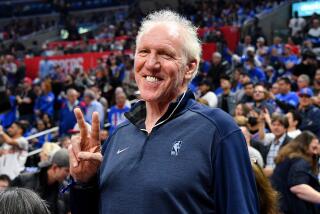Hard for Him to Close the Book
- Share via
He already had sent his wife back to the house they have rented for the Masters, so when Tom Watson saw her again a few minutes later at the door of the locker room early Thursday morning, he knew what she was going to tell him.
The last time Watson saw Bruce Edwards was three weeks ago during the Bay Hill tournament. Watson visited with Edwards at his house at Ponte Vedra Beach, Fla., and they talked about death, Edwards’ death, which they both knew was coming fast.
For the record:
12:00 a.m. April 11, 2004 For The Record
Los Angeles Times Sunday April 11, 2004 Home Edition Main News Part A Page 2 National Desk 0 inches; 31 words Type of Material: Correction
Golf championships -- An article in Friday’s Sports section about Tom Watson and the death of his caddie said that Watson has won nine major golf championships. He has won eight.
In that last face-to-face talk between friend and caddie of 30 years, Edwards said he wasn’t afraid to die. Watson said that he wasn’t either. Watson said he believed there is something beyond what we are here, what we feel, what we smell, what we see. He said Edwards believed the same thing.
And so when Hilary Watson walked up to her husband just inside the door of the locker room and whispered that Edwards had died less than an hour before, Watson did just what he and Edwards had long ago agreed upon.
Watson shoved a copy of Edwards’ yardage book for Augusta National into his back pocket and headed outside to play the first round of the Masters.
As it turned out, Watson was carrying a lot more than his old caddie’s yardage book as he walked the rolling fairways and the lush greens. This was the day that Watson dreaded, but had accepted 15 months ago when Edwards called with bad news.
After being examined at the Mayo Clinic, Edwards said he had been diagnosed with amyotrophic lateral sclerosis, Lou Gehrig’s disease. Edwards had learned that ALS is a progressive illness that attacks the nerve cells in the spinal cord and brain, leading to paralysis and death. There is no cure.
But those were not the exact words Edwards told Watson that night. Instead, he used a golf term.
Edwards said he had made a quad, or quadruple bogey. Watson responded in the same way, saying they were just going to have to get back to even par.
It simply didn’t work out that way. There was no happy ending to the Bruce Edwards story, just an ending. It was the one that everyone expected, though that didn’t make it any easier to take, especially for Watson, who tried his best nonetheless.
He has won the Masters twice, but at 54, Watson’s best days at Augusta National are behind him. He has missed the cut five times in the last six years and after opening with a four-over 76, he may miss it again.
Even if he does, that’s not what Watson is going to be thinking about today. Edwards will be on his mind. Watson might be remembering the first time they met in 1973 at a tournament in St. Louis. Watson was a shaggy-haired Stanford grad with a degree in psychology and Edwards was a shaggy-haired, happy-go-lucky kid from Connecticut with an unofficial degree in good times.
All Edwards wanted to do was caddie, and for 27 years, that’s what he did for Watson. In his career, Watson won nine majors, although Edwards was there for only one, the 1982 U.S. Open at Pebble Beach Golf Links, because rules at the Masters and the British Open precluded players from choosing their own caddies.
But it is that time at Pebble Beach, where Watson chipped in at the 17th hole on Sunday and wound up defeating Jack Nicklaus, that Watson says is his favorite moment in golf. Actually, it is more specific -- when he and Edwards hugged in an exuberant celebration on the 18th green.
After Watson finished his round Thursday, he said he felt as if Edwards were right there beside him the whole time. He was there in spirit. Watson said he thought it was typical of Edwards, knowing he was dying, to wait until the first day of the Masters, because it was his favorite tournament.
As for losing one of his favorite people, Watson says all he can do is try to raise money to fight the disease. He said specialists believe there could be a cure for ALS in five to 10 years, and Watson had hoped Edwards could hang on until then.
That was probably unrealistic, Watson admitted, but that didn’t make the message from his wife at the locker room door any less difficult to accept. Even though Watson knew Edwards was dying, he said they both thought they would have more time.
This time the player and the caddie were wrong. This was one number that couldn’t be found in the yardage book, the one Watson carried in his back pocket Thursday morning at the Masters.
More to Read
Go beyond the scoreboard
Get the latest on L.A.'s teams in the daily Sports Report newsletter.
You may occasionally receive promotional content from the Los Angeles Times.










